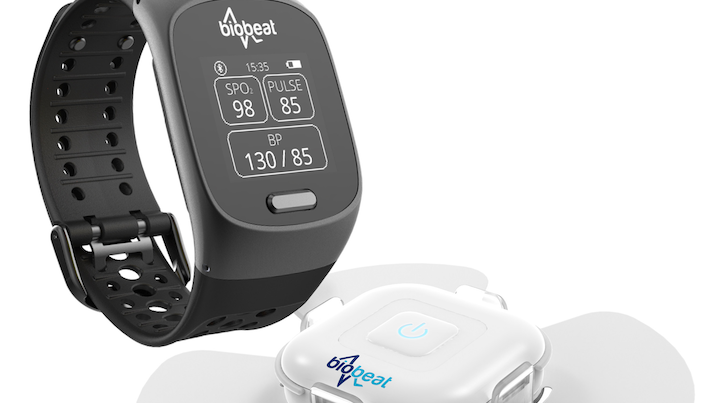FDA Clears Biobeat's Remote Patient Monitoring Wearable
The device measures blood pressure, oxygenation and heart rate, among other health data.

Photo/Thumb have been modified. Courtesy of Biobeat.
The U.S. Food and Drug Administration (FDA) today cleared Biobeat’s patch and wearable for measurement of blood pressure, oxygenation and heart rate for use in hospitals, clinics, long-term care and at home.
The biomedical technology developer’s products enable cloud-based healthcare with connectivity through a smartphone or other gateway.
“The promise of remote care for patients and the equally important continuum of care: connecting home-based, community and hospital care, will not happen without novel medical-grade sensors and we are proud to be the pioneers in this field,” said Dan Gelvan, Ph.D., chairman of the board.
The patch is a sticker that can be worn anywhere on the body for patients in the hospital or in a nursing home. The sticker takes samples hundreds of times per second for continuous, real-time measurement and broadcasts the data online through Android and iOS systems. The patch can work continuously for up to 10 days.
The wrist watch is intended for long periods and repeated use. The wearable measures parameters set by the user and features an accelerometer, Bluetooth communication, recording memory, temperature measurement, a photoplethysmogram (which detects blood volume changes) and a galvanic skin response sensor, which measures the electrical conductance of the skin.
The device can measure continuous blood pressure, mean arterial pressure, pulse and respiratory rate, sweat, movement and calories, among other health data. The watch also allows the wearer to set drug intake reminders and shows how treatment would be affected if useful.
All the health data that the wearable records can be shared with physicians and loved ones so that someone can intervene if needed.
Users can follow their vital signs, interact and add important health data through the Biobeat app. Data on the app are fully recorded and allows the provider to look at the trends of all vitals, enabling adjustment of the treatment and decision support regarding the users’ medical condition.
Biobeat provides working stations to providers to continuously monitor multiple patients at the same time. Data and trends can be shown on the screen in the working station and for each patient, alarm limit can be set.
“This clearance opens tremendous opportunities for remote monitoring of vital signs of patients and we are excited that we can now also offer this in the U.S. market,” said Arik Ben Ishay, founder and CEO of Biobeat.
But Biobeat isn’t the only developer focused on remote patient monitoring platforms.
In April, the FDA cleared Current Health’s artificial-intelligence-powered wearable for post-acute care. The armband, which includes Bluetooth integrations with other devices, passively measures a patient’s vital signs in real-time.
Get the best insights in digital health directly to your inbox.
Related
How a Video Selfie Could Help Monitor Blood Pressure
FDA Clears Theranica Wearable to Treat Migraine Headaches
Zoll Launches FDA-Cleared Remote-Monitoring System for Heart Failure